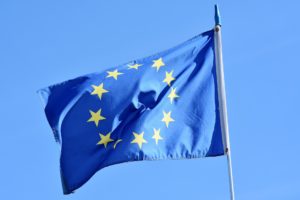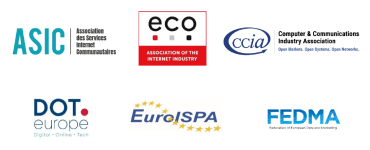Highlights from the Past Week
CW 2 / Monday, 9 to Thursday, 12 January: Political Group and Committee Meetings Week (Brussels);
E-EVIDENCE – VOTE POSTPONED IN EP: Last week, the vote on the E-Evidence Regulation was planned to have taken place in the Committee on Civil Liberties (LIBE). After several members in the Council requested more time for scrutiny, the European Parliament postponed the vote on the trilogue compromise for an interim period. The next opportunity for a new round will be on 30 or 31 January.
Meanwhile, the LIBE Committee has endorsed the ratification of the Second Additional Protocol to the Budapest Convention on Cybercrime of the Council of Europe. Following on from the vote that is still open in the plenary, it can then be ratified by Member States. (see EP press release)
COPYRIGHT – COMMISSION LAUNCHES CALL FOR EVIDENCE ON ONLINE PIRACY OF LIVE CONTENT: Last Friday, the EU Commission launched a call for evidence on issues related to combatting online piracy of live content. The deadline for feedback is 10 February.
The Commission aims to gather experience and evidence from all relevant stakeholders on online piracy of live events and on the functioning of relevant EU and national rules, in particular on:
- the extent of unauthorised retransmission online of live events;
- the processing of notices by online intermediaries in the case of live events;
- the efficiency of dynamic and live blocking injunctions, and the accompanying procedural safeguards ensuring fundamental rights;
- the practices and challenges of addressing unauthorised retransmission of live events affecting several Member States; and
- the role of national competent authorities, in particular in the use of dynamic and live blocking injunctions, and experience of or opportunities for cross-border cooperation.
The objective is to issue a recommendation in which the Commission encourages Member States and market players to take more effective action against the unauthorised online retransmission of live events. The focus is on three areas: (1) prompt removal, (2) use of IPRED remedies, and (3) enhancing cooperation among the relevant national authorities and between rightholders and intermediaries.
The adoption of the recommendation by the Commission is scheduled for the second quarter of 2023.
AI LIABILITY – COMMISSION PRESENTS PROPOSAL TO EP COMMITTEE: Last Monday, Justice Commissioner D. Reynders officially presented the proposal for an AI Liability Directive to MEPs of the Committee on Legal Affairs JURI). (video)
Commissioner Reynders explained that the main objective of the proposed measure is to amend the civil liability rules related to artificial intelligence (AI) in order to: (i) improve legal certainty in this area for companies in the Single Market; (ii) increase consumer confidence in this technology; and (iii) ensure the same level of protection for victims of AI as for victims of other types of technologies or products.
Reynders emphasised that it is too early for a strict harmonisation of AI liability and compulsory insurance, given that this technology is still under development.
Reynders concluded his presentation by informing MEPs that the proposal is already being discussed in the Council and that the Commission encourages the Parliament to move forward with the work on this dossier as soon as possible.
Rapporteur A. Voss (EPP, DE) then took the floor to state that starting work on the dossier had proved difficult due to the close link with the proposed AI Act, for which negotiations were still ongoing. Voss expressed his firm belief that a regulation would be the better instrument for this initiative, as it would ensure greater harmonisation across the EU, rather than potentially leading to 27 different systems across all Member States.
AI ACT I – GERMANY’S RESERVATIONS REGARDING COUNCIL COMPROMISE: On 6 December, ministers gathered at the EU Telecom Council confirmed their support of the general approach to the AI Act, which aims to regulate artificial intelligence based on its potential to cause harm.
While Germany’s Federal Minister for Digital Affairs, Volker Wissing, welcomed the compromise, he noted that “there is still room for improvement”. He said he would like to see Germany’s concerns being taken on board during the trilogue negotiations with the European Parliament and the Commission.
For example, Germany is in favour of a total ban on real-time biometric identification in public spaces. AI applications should also not be used in the risk assessment of a person with regard to criminal offences, nor by public authorities as lie detectors or for emotion recognition. Similarly, Germany wants a ban on AI systems used for systematic monitoring of performance and behaviour in the workplace without a specific reason. (see Euractiv)
AI ACT II – NEW COMPROMISES IN THE EP: The co-rapporteurs circulated a new batch of compromise amendments to the AI Act, proposing stricter obligations for users of AI systems with high risk. The responsibility of the users of such systems has also been stepped up, in particular to ensure that the AI has the appropriate robustness and cybersecurity measures. For the workplace, no AI should be allowed to be used without the employees’ consent. A transparency obligation has been added for users of generative AI models such as ChatGPT. The conditions under which a third party becomes responsible for a system were clarified.
The new proposals were the focus of a technical meeting held on Wednesday. The discussion on the new article on a fundamental rights impact assessment is to continue on Tuesday. The main issues still to be clarified are the general purpose of AI and the high-risk list in Annex III. (see Euractiv)
DATA ACT I – SWEDEN SEEKS CONFIRMATION FROM COUNCIL: Stockholm has circulated an options paper on the Data Act, inviting Member States to comment on some of the most controversial points of the Act, namely the SMEs exemption, B2G data sharing and trade secrets. The Presidency’s approach is not to propose anything new. The options include either confirming the Czech Presidency’s last compromise, returning to the Commission’s original proposal or presenting a more detailed proposal. The representatives of EU governments had until Thursday to submit written comments which, together with the discussion that will take place on Tuesday, will form the basis for a new compromise text expected by the end of January. (see Euractiv)
DATA ACT II – NEW PROPOSALS IN THE EP: Discussions on the law on the protection of personal data in the EU Parliament’s Single Market Committee (IMCO) have revived the well-known topic of functional equivalence for cloud providers, after rapporteur A. Bielan’s attempt to remove this concept from the text was rejected.
The latest crop of compromise amendments seeks to refine the process with some key caveats, specifying portability obligations for cloud providers and removing switching charges such as egress fees. The text was discussed in a shadow rapporteurs’ meeting on Thursday. Following on from last Friday, another technical meeting is to be held on Monday to consolidate the text by mid-week. The committee vote is scheduled for 24 January. (see Euractiv)
DIGITAL MARKETS ACT – PRESENTATION OF NEW AUTHORITY: At a public event organised by the think tank CERRE, A. Bacchiega of the Directorate General of Competition (DG COMP) said that the new directorate in charge of the DMA enforcement and antitrust cases in the technology sector would be announced in the following week. It is expected to comprise about 40 officials in total, including new recruits.
It is not clear if Bacchiega himself, who is currently the director for competition cases related to information, communication and media, will lead the new directorate, nor if the newly appointed director will be the single point of contact for collaborating with DG CNECT on the DMA implementation. (see Euractiv)
CSAM – OPPOSITION TO EU CENTRE: Several EU countries, including Ireland, Greece and Hungary, have been in dispute with the European Commission over a new central agency to combat child abuse content. The compilation of comments (PDF) sets out the positions of the various capitals from July to September 2022, with this occurring shortly after the EU Executive published its draft legislation to combat the affliction on the Internet.
Certain EU countries fear that the centre could interfere with their own national mechanisms for combatting child sexual abuse. Others are simply frustrated that the Netherlands was chosen instead of them.
It’s not surprising to learn that Berlin and Vienna strongly oppose the proposed investigative orders out of concern for privacy. Austria called the measure a “massive encroachment on the fundamental rights”. The Netherlands and Lithuania also voiced their fears about end-to-end encryption. Belgium warned that while the highest form of encryption is important, it should not be used as a “technical excuse” to fulfill the obligations to check messages for illegal content.
Countries such as Ireland and France find the rules under which public authorities can order the removal of child abuse or block a platform too cumbersome and argue that law enforcement agencies must act quickly. (see Politico Pro, paywall)
GERMANY – FEDERAL NETWORK AGENCY EXTENDS BANNING LIST FOR RUSSIAN MEDIA: The German Federal Network Agency (BNetzA) has extended the banning list of Russian media providers:
“This means that, as of 1 February 2023, the blocking of the following domains is justified from a domestic perspective pursuant to Art 3(3)(a) of Regulation (EU) 2015/2120 (‘by Union law in the form of Sanctions Regulation 833/2014 as adapted by Regulation (EU) 2022/350’), subject to a decision by the Council by means of an implementing act after having examined the cases concerned.”
NTV/NTV Mir
- ntv.ru
- ru
REN TV
- tv
Perviy Kanal
- ru
Russia 1
- com (vgl. freeintertv.com/view/id-3163)
- tv (vgl. https://ontvtime.tv/russia-1)“
Relevant Publications, including from the EP Think Tank:
- Policy Departments’ Monthly Highlights – January 2023 (At a Glance)
- The Global Gateway: Taking stock after its first year (Briefing)
- 30 years of the European single market (Briefing)
- Thirtieth anniversary of the single market (1993-2023) (At a Glance)
- Digital rights and principles (At a Glance)
Outlook for the Current Week
You can find a list of the upcoming dates of the European Parliament here, as well as an overview of the plenary session week.
The meeting calendar for 2023 is available here (PDF).
An overview of the most important dates of the Council week can be found here and the meeting calendar can be accessed here.
The official calendar as well as the programme of the Swedish Presidency can be found on the relevant website.
Included among these dates are:
Summits and Ministerial Meetings::
- Economic and Financial Affairs Council, Tuesday, 17 January – Agenda, A Items, A Items Addition;
Preparatory Bodies:
- Horizontal Working Party on Enhancing Resilience and Countering Hybrid Threats, Monday, 16 January;
- Working Party on Competitiveness and Growth (Internal Market) (incl. Ecodesign), Monday, 16 January and Friday, 20 January;
- Working Group Judicial Cooperation in Criminal Matters (COPEN), Monday, 16 and Tuesday, 17 January, Wednesday, 18 and Thursday, 19 January;
- Working Party on Telecommunications and Information Society (incl. Data Act), Tuesday, 17 January;
- Law Enforcement Working Party (Police) (incl. CSAM), Thursday, 19 and Friday, 20 January;
- Horizontal Working Party on Cyber Issues, Wednesday, 18 January and Friday, 20 January;
- COREPER I, Wednesday, 18 January;
- COREPER II, Wednesday, 18 January;
Information on the weekly Commission meeting can be found on the Commission’s website in the preview (PDF) or (at short notice) in the current agenda. The following topic is on the agenda for the coming week (latest draft, PDF):
- Harnessing talent in Europe’s regions
You can find the judicial calendar of the ECJ here.
European Parliament Committees
CW 3 / Monday, 16 to Thursday, 19 January: Plenary Sessions Week (Strasbourg);
LIBE Committee (Civil Liberties)
Current Meetings
- None
Further Meetings (Calendar)
- Monday, 30 January 2023, 15.00-18.30 (Brussels)
- Tuesday, 31 January 2023, 9.00-12.30 and 14.00-18.00 (Brussels)
JURI Committee (Legal Affairs)
Current Meetings
- None
Further Meetings (Calendar)
- 23/24 January 2023 (Brussels)
Dossiers Timetable (13 December 2022)
ITRE Committee (Industry)
Current Meetings
- None
Further Meetings (Calendar)
- Monday, 23 January 2023, 15.00-18.30 (Brussels)
- Tuesday, 24 January 2023, 9.00-12.30 and 14.30-18.30 (Brussels)
Dossiers Timetable (13 January 2023)
IMCO Committee (Internal Market)
Current Meetings
- None
Further Meetings (Calendar)
- Monday, 23 January 2023, 15.00-18.30 (Brussels)
- Tuesday, 24 January 2023, 9.00-12.30 and 14.30-18.30 (Brussels)
Dossiers Timetable (December 2022)
CULT Committee (Culture)
Current Meetings
- None
Further Meetings (Calendar)
- Monday, 23 January 2023, 15.00-18.30 (Brussels)
- Tuesday, 24 January 2023, 9.00-12.30 and30-18.30 (Brussels)
PEGA Committee (Pegasus Committee of Inquiry)
Current Meetings
- None
Further Meetings
- Monday, 23 January 2023, 15.00-18.30 (Brussels)
INGE2 Committee (Special Committee on Foreign Interference)
Current Meetings
- None
Further Meetings (Calendar)
- Open
Further Parliamentary Calendar Dates
- CW 4 / Monday, 23 to Thursday, 26 January: Committee and Mini-Plenary Session Week (Brussels);
- CW 5 / Monday, 30 January to Thursday, 2 February: Mini-Plenary Session Week (Brussels);
- CW 6 / Monday, 6 to Thursday, 9 February: Political Group and Committee Meetings Week (Brussels);




